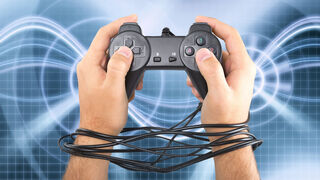DSM
How Much Is Too Much? When Video Gaming Becomes a Disorder
Signs that a gamer's habits are becoming unhealthy and how to intervene.
Posted December 12, 2020 Reviewed by Lybi Ma

While enduring months of the COVID-19 pandemic, Americans have become adept at finding ways to stay entertained while staying at home. With video game systems and video games sales on the rise, it appears that playing games like Minecraft, Overwatch, and Grand Theft Auto 5 are providing hours of fun in a bleak time. In fact, according to the Entertainment Software Association, “…64 percent of U.S. adults and 70 percent of those under 18 regularly play video games.”
Now, as Santa’s little helpers scour stores and websites looking for the PlayStation 5, Xbox Series X, or Nintendo Switch, there may be a lurking question in the back of their minds–how much gaming is too much? Given the need to stay indoors, video games can provide a platform for social connectivity when played with friends online. Last spring, during "unprecedented times" related to COVID-19, many justified their increased time spent gaming as a welcome distraction from the world and national events.
Now, nine months into the pandemic, there are increasing signs that excessive gaming is becoming a mental health concern. A survey from Parents Together found that of 3,000 parents surveyed, 85 percent were worried about the length of time their children spend online. Nearly half of the respondents said their children's screen time exceeds six hours a day, compared with just 8 percent before the pandemic.
There is significant debate about whether behaviors that are normal for hundreds of millions of regular gamers should be pathologized. While concerns over the addictive properties of video games are reasonable, there are also valid concerns over the risk of thoughts, feelings, and behaviors of many gamers being labeled as pathological.
This could stigmatize many psychologically healthy people for whom gaming has become one of their main hobbies. As the debate over pathologizing gaming continues, there is agreement that gaming can evolve into problematic behavior.
Who Says It’s a Gaming Disorder?
Clinicians commonly consult or refer to the International Classification of Disease, Eleventh Revision (ICD-11), a system of medical coding created by the World Health Organization (WHO) for documenting diagnoses, diseases, signs, and symptoms and social circumstances as well as the Diagnostic and Statistical Manual of Mental Disorders–5th Edition (DSM-5), which categorizes mental illnesses and outlines their symptoms and is published by the American Psychiatric Association.
The ICD-11 includes a gaming disorder, while the DSM-5 does not recognize problems with gaming as a distinct disorder. However, it does acknowledge it warrants additional clinical research and study.
According to the ICD-11, gaming disorder is characterized by a pattern of persistent or recurrent gaming behavior occurring either online or offline, manifested by:
- Impaired control over gaming (e.g., gaming longer, more frequently, or being unable to stop gaming).
- Increasing priority given to gaming over other life interests and daily activities.
- Continuation or escalation of gaming despite negative consequences.
Additionally,
- The behavior results in significant impairment in personal, family, social, educational, occupational, or other important areas of functioning.
- The behavior may be continuous or episodic and recurrent.
- The behavior is normally evident over at least 12 months, although the required duration may be shortened if all diagnostic requirements are met and symptoms are severe.
According to the DSM-5, five or more of the following symptoms have to have been experienced in the last year and have caused clinically significant impairment:
- Preoccupation with gaming; withdrawal symptoms when gaming is taken away or not possible (i.e., sadness, anxiety, or irritability).
- Tolerance, the need to spend more time gaming to satisfy the urge.
- Inability to reduce playing, unsuccessful attempts to quit gaming.
- Giving up other activities.
- Loss of interest in previously enjoyed activities due to gaming.
- Continuing to play games despite problems.
- Deceiving family members or others about the amount of time spent on gaming.
- Use of gaming to relieve negative moods, such as guilt or hopelessness.
- Risk, having jeopardized or lost a job or relationship due to gaming.
Help for Problematic Gaming
If you’re concerned about an increase in gaming behavior, there are a few steps that can be taken to reduce gaming activities before they become more problematic:
- Keep track of time spent gaming and determine if these patterns are interfering with relationships, responsibilities, or hobbies. Ask family members and/or friends for objective, non-judgmental feedback regarding gaming habits.
- If change is necessary and monitoring time spent gaming becomes difficult, it may be time to take a “digital holiday,” a “tech break.” or a “digital detox.” Designate time without access to gaming and other internet or video sources.
- Increase interests separate from gaming. Although current events have affected face-to-face socialization, explore other avenues for socializing that do not involve gaming activities.
- Allow time to re-balance physical and emotional needs, emphasizing nutrition, adequate sleep, regular exercise, and, when safe and appropriate, social interaction.
- Reintroduce the benefits of spending time in nature and experiencing the rewards of real-time living. Being outdoors, taking a hike, walking a dog, working in a garden, etc. allows space for being present and mindful.
- Although it is virtually impossible to achieve abstinence from “screen time,” a Harm Reduction Plan, a common tool used by addiction professionals, can be helpful. This plan would create guidelines to address the problematic behavior, determine internal and external warning signs, identify a support system, and summarize what steps to take should the plan prove ineffective.
- There are support groups online for those who experience symptoms of problematic gaming as well as for family and friends of gamers. Online Gamers Anonymous (OLG) and OLG-Anon provide support and advocate a 12-step program of recovery.
If some of these suggestions are difficult to implement or cause you a disproportionate amount of distress, please seek out help from a trained professional for help, guidance, and support.
Dalanna Burris, MS, LCDC is an addictions counselor at The Menninger Clinic. She has expertise in substance use treatment, problematic sexual behavior, and gaming addiction, and she serves on the Comprehensive Psychiatric Assessment Service.
Facebook/LinkedIn image: Diana Grytsku/Shutterstock




